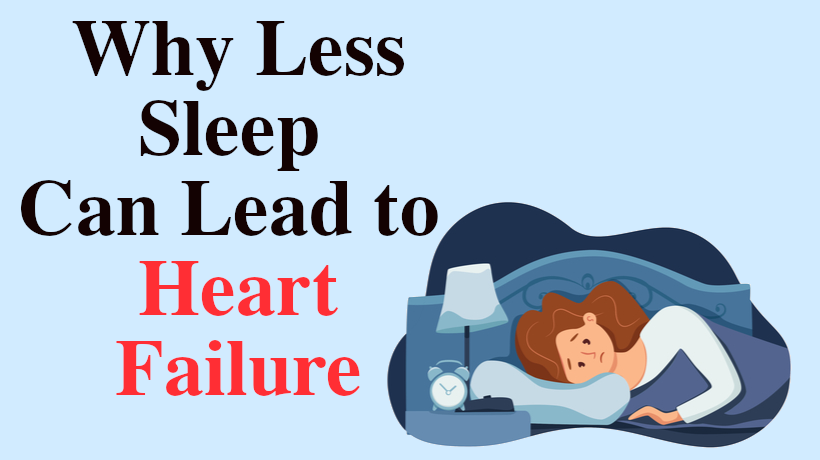It’s no wonder that we say “get a good night’s sleep” when someone you love is sick. Recent research shows getting adequate and quality sleep may lead to a lowered risk of heart failure and other heart-related diseases.
The National Sleep Foundation emphasized the importance of getting a good night’s sleep.
Recent Studies
A new study published in the American Heart Association journal “Circulation” found that “adults with the healthiest sleep patterns had a 42 percent lower risk of heart failure, regardless of other risk factors, compared to those with a less healthy sleep routine.”
Dr. Steven H. Feinsilver, director of the Center for Sleep Medicine at Lenox Hill Hospital in New York, said, “It turns out the average human being needs about 7 and 1/4 hours of sleep per night. [That comes] from studies that show people who get a lot less than that or a lot more than that, die faster.”
According to the CDC, one in three American adults says they don’t get the recommended amount of sleep. The CDC notes that certain health conditions like high blood pressure, type 2 diabetes, and obesity may be linked to poor sleep quality.
The National Sleep Foundation state, “Without sufficient nightly sleep, a person doesn’t spend enough time in the deep stages of NREM sleep that benefit the heart.”
They also note that abrupt awakenings can cause rapid increases in pulse and blood pressure, ultimately raise the risk of chest pain and heart attacks. Certain sleep conditions, such as sleep apnea and insomnia, may also negatively affect your heart health.
Throughout this article, you will find how poor sleep affects certain parts of your body and the body’s functions.
Sleep and Blood Pressure
When the body goes to sleep, the blood pressure naturally drops by approximately 10-20%.
Poor sleep — meaning whether you did not sleep for the recommended amount of time or you were disturbed by others — may cause high blood pressure, as told by the National Sleep Foundation.
The NSF also notes non-dipping has been tied to an increased risk of stroke and heart attack. It’s also been linked to kidney problems and reduced blood flow to the brain.
Sleep and Coronary Heart Disease
Coronary heart disease is prevalent in the United States, with more than 3 million cases per year. Coronary heart disease occurs when the arteries are narrow due to the build-up of plaque, making it harder for red blood cells (that carry oxygen) to deliver enough oxygen and blood to the heart.
The NSF has found that sleep deprivation contributes to the narrowing of arteries. Insufficient sleep may also trigger chronic inflammation, which hardens the arteries, as well.
Hypertension (high blood pressure), as noted above, may strain the arteries as well, making it more challenging to transfer blood to the heart. When the blood does not have enough oxygen or blood, it can contribute to heart disease.
Sleep and Heart Attacks
The NSF found that sleep deprivation heightens the risk of heart attacks. In a 2019 study published by the National Library of Medicine, the research had shown people who slept less than six hours per night had a 20% higher chance of a heart attack.
“While the NREM sleep stage helps the heart slow down and recover, REM sleep involves heightened stress and activity,” The National Sleep Foundation state. “Insufficient sleep can throw off the balance of these stages, increasing heart attack risk.”
Sleep and Obesity
Insufficient sleep may lead to obesity. Unfortunately, it is a common condition that is caused by sleep apnea.
Dr. Sreenivas Gudimetla, a cardiologist at Texas Health Harris Methodist Hospital, said, “Lack of sleep can cause unhealthy weight gain. There have been some epidemiological studies published demonstrating an association with short sleep duration and excess body weight reported on all age groups.”
Dr. Ashesh Parikh, DO, a cardiologist at Texas Health Presbyterian Hospital, explained that “obesity increases the risk of obstructive sleep apnea, and there are signs doctors will look for.”
This is why it is so important to get diagnosed and be treated with sleep apnea. “sleep apnea causes a lot of cardiac conditions, from diabetes to irregular heart rhythms, such as atrial fibrillation.”
The National Sleep Foundation explains, “People who sleep less than seven hours per night are more likely to have a higher body mass index (BMI) or be obese. Sleep helps regulate the hormones that control hunger, and lack of sleep can trigger overeating and boost the desire for high-calorie foods.
Tips on Getting Better Sleep
Below are a few ways for you to get better sleep, as recommended by the CDC.
- Stick to a regular sleep schedule. Go to bed at the same time each night and get up at the same time each morning, including on the weekends.
- Get enough natural light, especially earlier in the day. Try going for a morning or lunchtime walk.
- Get enough physical activity during the day. Try not to exercise within a few hours of bedtime.
- Avoid artificial light, especially within a few hours of bedtime. Use a blue light filter on your computer or smartphone.
- Don’t eat or drink within a few hours of bedtime, especially alcohol and foods high in fat or sugar.
- Keep your bedroom cool, dark, and quiet.
Sources:



